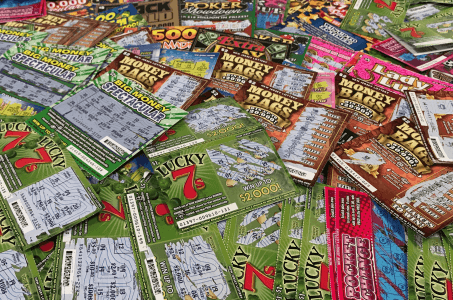Gaming Lawyers Praise New Hampshire Court Ruling on Wire Act But Identify Decision’s Limitations
Posted on: June 5, 2019, 01:09h.
Last updated on: June 5, 2019, 01:09h.
Lotteries and online casino operators are far less likely to face prosecution after a New Hampshire federal judge this week rejected an expanded Department of Justice (DOJ) interpretation of the Wire Act. But gaming attorneys caution there remain numerous unanswered questions.

In his decision released on Monday, U.S. District Court Judge Paul Barbadoro clearly ruled that the federal Wire Act “is limited to sports gambling.” He also agreed with many of the arguments raised by attorneys for the New Hampshire state lottery and its operators, which brought the lawsuit against the DOJ.
Their court action challenged the DOJ’s Office of Legal Counsel’s (OLC) 2018 controversial reinterpretation of the 1961 law. For years, the DOJ held the law applied only to sports betting.
Many gaming lawyers also predict there is a high possibility Barbadoro’s decision will be appealed by the DOJ. A Justice Department spokesman said the DOJ is reviewing the ruling.
For now, it has impact for an extended time. An appeal of the New Hampshire case to the First Circuit Court of Appeals would take a year or more — and it is even longer to get a response from the U.S. Supreme Court, just to see if the justices want to accept the case.
The appellate process should last longer than the first term of the Trump administration,” Daniel Wallach, a Florida-based gaming lawyer who co-founded the University of New Hampshire Law Sports Wagering & Integrity Program, told Casino.org. That may make it a “guardrail” against prosecution for the next year or two and it will become, in effect, a “de facto injunction” during the rest of the president’s first term, he added.
Lotteries, State Governments Express Relief
“Although the ruling technically only applies to New Hampshire, I think all states who count on lottery profits for their budgets can breathe a sigh of relief,” Steven Silver, a sports law attorney at Maine’s Ogletree Deakins, told Casino.org.
UNLV Law Professor Tony Cabot adds the ruling is also “significant” for multi-state lotteries, as well as online poker and casino games.
“If, as the court decided, the Wire Act does not apply to them, then the states can authorize online gaming on these activities,” Cabot told Casino.org.
Also, a state “can enter interstate compacts/agreements — multi-state lotteries and poker liquidity agreements — … as long as it is lawful in both states,” Cabot advised.
“This is Christmas come early for online poker,” Silver additionally commented. “I have to imagine that this ruling paves the way for new interstate poker compacts. It also likely helps states that have been sitting on the sidelines in terms of online gaming to start moving forward.”
That means there could be more investment in online gaming operations, according to Stephen Schrier, a Philadelphia attorney, who co-chairs Blank Rome’s gaming practice and is chair of the firm’s sports practice group.
“The court’s decision is helpful to online casino gaming and poker because the Wire Act has been eliminated as a possible basis for finding their intra-state operations to be violative of federal law,” he told Casino.org. “Many states and operators were awaiting word on this case before proceeding further.”
But even with compliments from gaming lawyers for the judge’s decision, there are still “unanswered questions,” Wallach confirmed.
Intermediate Routing
For instance, the decision does not address “intermediate routing” in intrastate sports betting. This is where even if bets are placed in the same state and the server is in the same state — signals can still travel across state lines, Wallach explained.
That is because the “data … sent between the bettor and sportsbook may travel out-of-state in order to find the most efficient path of communication,” Keith Miller, a gaming law professor at Drake University, told Casino.org. Under the 2018 OLC opinion, “that could still amount to an interstate transmission subject to the Wire Act,” he explained.
The language used in the New Hampshire ruling raises some other issues, too. John T. Holden, a sports law specialist and professor at Oklahoma State University, told Casino.org “the implications of this case are far bigger than the Wire Act.”
“The question over whether an OLC opinion is a final judgment under the Administrative Procedures Act could have broad implications, which the government may wish to protect by appealing this case,” Holden explained. Another possible concern to the DOJ relates to whether a party has standing to file a suit.
“The scope of the Wire Act may actually be of secondary importance to the Department of Justice, at least in comparison to the other issues this case raises,” Holden warned.
The New Hampshire ruling also opens “the door for states with iGaming to bring their own lawsuits and try to make the hole in the 2018 opinion a little bigger,” Holden added.
This decision in all likelihood is the first small step in what will be litigation that is protracted over many years so I would caution anyone about getting too excited about it just yet,” Holden cautioned.
Another criticism comes from Silver who noted “the court… stopped short of issuing a nationwide injunction or declaratory relief.”
“If you are going to set aside the DOJ opinion and grant relief that extends beyond New Hampshire’s borders to parties who operate in multiple states, then it is somewhat bizarre that we did not see some sort of national relief here,” Silver said.
But Matthew D. McGill, an attorney from Gibson Dunn, which represented New Hampshire lottery operator NeoPollard Interactive, said in a statement, the ruling “safeguards the New Hampshire Lottery and its service providers from the threat of unlawful prosecution. And … this ruling has nationwide impact.”
Yet, the Coalition to Stop Internet Gambling released a statement that “other jurisdictions will see this issue very differently.”
Related News Articles
Nebraska Lottery Won’t Pay Out on 405 Misprinted Scratch-Off Tickets
Powerball Ticket Stolen from ‘Rightful’ Winner, $2.04B Lawsuit Claims
Most Popular
Las Vegas Overstated F1 Race’s Vegas Impact — Report
Vegas Strip Clubs Wrestle in Court Over Animal Names
Most Commented
-
End of the Line for Las Vegas Monorail
— April 5, 2024 — 90 Comments -
Mega Millions Reportedly Mulling Substantial Ticket Price Increase
— April 16, 2024 — 6 Comments -
Long Island Casino Opponents Love New York Licensing Delays
— March 27, 2024 — 5 Comments -
Nearly Abandoned Mall Outside Vegas Soon to Have Only One Tenant
— March 12, 2024 — 5 Comments
















No comments yet